

A New Net-Neutrality Battle Brews Over...Text Messages. Free Press/CC When Verizon pulled the plug on Gene Lew’s company, it gave no warning.
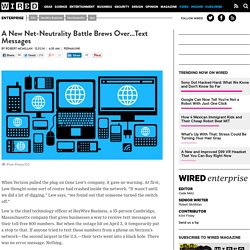
At first, Lew thought some sort of router had crashed inside the network. “It wasn’t until we did a lot of digging,” Lew says, “we found out that someone turned the switch off.” Lew is the chief technology officer at HeyWire Business, a 35-person Cambridge, Massachusetts company that gives businesses a way to receive text messages on their toll-free 800 numbers.
But when the outage hit on April 3, it temporarily put a stop to that. What is network neutrality? - Everything you need to know about network neutrality. While network neutrality regulation has been the focus of Internet policy debates over the last decade, it is not the only way to promote an open Internet.
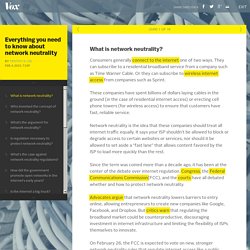
Here are some alternative strategies. Unbundle the last mile: The most expensive part of any broadband network is the "last mile" — the glass or copper cable that connects your house to the nearest ISP facility. This part of the network is expensive because it requires tearing up streets and lawns all over town. Because the process is so expensive, it's difficult to convince multiple companies to build cables to a customer's home. Unbundling is a policy that forces companies that have already built cables in a neighborhood — usually your local phone or cable company — to lease this part of their network to competitors at regulated rates. App makers may pick up part of your mobile data tab in the future. Cellular carriers may be looking into the data equivalent of 800 numbers to lighten the financial burden of data on customers, the Wall Street Journal reported today.

A representative from AT&T said at Mobile World Congress on Tuesday that a new feature would allow app makers, rather than customers, to accept responsibility for data, so that the data usage for that app would not be reflected in the customers' bills. While this would provide some relief for users, it's also an attempt to deflect calls to raise or do away with data usage caps. John Donovan, senior executive vice president of AT&T's technology and network operations, told the WSJ that the system would be similar to the way toll-free phone numbers work.
When customers call an 800 number, long-distance charges and other fees don't apply to them, and costs of the call become the burden of the service called. There are yet bigger data hogs that might benefit, too. Stand up for Net Neutrality. #OccupytheInternet: Net Neutrality Is Under Attack. Censorship, Privacy, Anonymity, and Net Neutrality Defend Free Speech on the Internet. Dear Obama: Dial F-C-C for Neutrality. President Obama pledged to take a “back seat to no one” in support of real Net Neutrality.
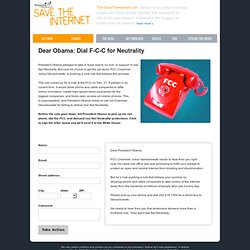
But now his choice to get the job done, FCC Chairman Julius Genachowski, is pushing a new rule that betrays this promise. The rule comes up for a vote at the FCC on Dec. 21. If passed in its current form, it would allow phone and cable companies to stifle online innovation, create high-speed lanes exclusively for the biggest companies, and block open access on mobile phones. This is unacceptable, and President Obama needs to call out Chairman Genachowski for failing to deliver real Net Neutrality. Before the vote goes down, tell President Obama to pick up his red phone, dial the FCC, and demand real Net Neutrality protections. Dear President Obama: Accept No Substitute for Real Net Neutrality. After more than a year of waffling on Net Neutrality, FCC Chairman Julius Genachowski just announced plans to issue weak regulations that give just about everything to giant phone and cable companies, and leave Internet users with almost nothing.
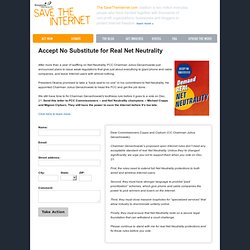
President Obama promised to take a “back seat to no one” in his commitment to Net Neutrality. He appointed Chairman Julius Genachowski to head the FCC and get the job done. We still have time to fix Chairman Genachowski's toothless rule before it goes to a vote on Dec. 21. Send this letter to FCC Commissioners -- and Net Neutrality champions -- Michael Copps and Mignon Clyburn. The Money Behind the Commerce Subcommittee Vote on Net Neutrality. GOP leader John Boehner vows to eliminate ‘net neutrality’ By Eric W.
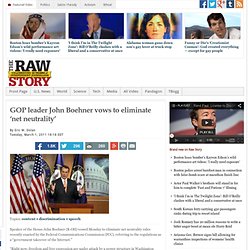
DolanTuesday, March 1, 2011 18:18 EDT Speaker of the House John Boehner (R-OH) vowed Monday to eliminate net neutrality rules recently enacted by the Federal Communications Commission (FCC), referring to the regulations as a “government takeover of the Internet.” “Right now, freedom and free expression are under attack by a power structure in Washington populated with regulators who have never set foot inside a radio station or a television studio,” Rep. Boehner said during a speech at the annual National Religious Broadcasters convention. Reclaim the Media: Cantwell, Franken introduce legislation to protect net neutrality.
Today, U.S.
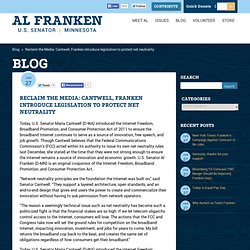
Senator Maria Cantwell (D-WA) introduced the Internet Freedom, Broadband Promotion, and Consumer Protection Act of 2011 to ensure the broadband Internet continues to serve as a source of innovation, free speech, and job growth. Though Cantwell believes that the Federal Communications Commission’s (FCC) acted within its authority to issue its own net neutrality rules last December, she stated at the time that they were not strong enough to ensure the Internet remains a source of innovation and economic growth. U.S. Senator Al Franken (D-MN) is an original cosponsor of the Internet Freedom, Broadband Promotion, and Consumer Protection Act. The Can-You-Hear-Us-Now-athon - Brought to you by SavetheInternet.com. David Segal: The Chamber of Commerce's Agenda: Killing Net Neutrality and Censoring the Internet.
With Aaron Swartz The U.S. Chamber of Commerce's attempt to throw next week's elections is cause for widespread alarm -- their agenda includes privatizing social security, undoing worker and consumer rights, blocking environmental protections, keeping banking regulations loose, and stymieing important health care reforms.
The true economic value of the Internet? Lots of people - Thursday was the last day for comments on the Federal Communications Commission's proposals to bolster the agency's Internet nondiscrimination rules, and under the wire comes another study that suggests that net neutrality makes good economic sense—we summarized a somewhat similar report on Monday.
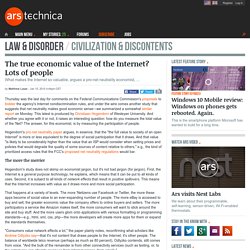
This latest is produced by Christiaan Hogendorn of Wesleyan University. And whether you agree with it or not, it raises an interesting question: how do you measure the total value of the 'Net? The answer, for this economist, is by measuring the participation of people.